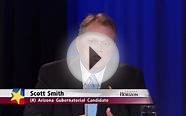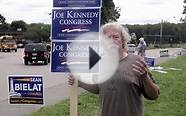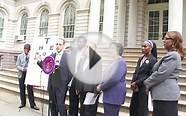Primary Elections are
 Lyle Denniston looks at how the battle to win congressional primary elections today may run counter to advice given by James Madison more than 200 year ago.
Lyle Denniston looks at how the battle to win congressional primary elections today may run counter to advice given by James Madison more than 200 year ago.
The statements at issue:
“I guess to be able to run for the Senate as a Republican in most places of the country, you need to have a resume that says I helped filibuster one of the president’s nominees. Maybe that helps. Maybe that keeps a Tea Party guy from running against you.”
— Senator Harry Reid, Nevada Democrat and majority leader of the Senate, in a speech in that chamber on February 14, after Republican senators barred a vote on the nomination of former Senator Chuck Hagel to be secretary of defense in the Obama Cabinet.
“[Senator Lindsey] Graham [South Carolina Republican] acknowledged the pressure when I asked him about the influence of home-state politics on his recent actions. ‘You know, I’m in a red state. I know I’m always exposed in a Republican primary, ’ he said. … Graham, to get through the 2014 primary, needs to say ‘no’ more often now. … This may be the only way a sensible lawmaker can survive it.”
– Dana Milbank, Washington Post writer, in an op-ed column on February 16, commenting on a press conference held by Senator Graham after the Hagel nomination was temporarily put on hold.
“The opening salvos were launched in a very public and very nasty civil war between establishment Republicans and Tea Party supporters when it was reported that Karl Rove was backing a new group, the Conservative Victory Project, to counter the Tea Party’s selection of loopy congressional candidates who lose in general elections. The Tea Party was having none of it.”
– Charles M. Blow, New York Times writer, in an op-ed column on February 9, commenting on the emergence of the Conservative Victory Project
We checked the Constitution, and…
The word “party” and the phrase “primary election” appear nowhere in the Constitution, and America was electing its third president before political parties even began to emerge. It would not be until the early 20th century that primary elections would become common, as a way to take the selection of candidates away from party “bosses” and return it to the voters.
But something has happened to the party primary in recent years that is leading some academics who specialize in elections to go so far as to propose that the primary be abolished altogether. The claim is that, increasingly, only the parties’ most activist elements tend to dominate those elections, and that contributes to partisan polarization. The primary has become an instrument, or so the critics say, to try to “purify” the party to make sure that it does not stray philosophically from the true political dogma and yield to compromise.
You might also like












